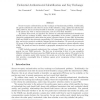Free Online Productivity Tools
i2Speak
i2Symbol
i2OCR
iTex2Img
iWeb2Print
iWeb2Shot
i2Type
iPdf2Split
iPdf2Merge
i2Bopomofo
i2Arabic
i2Style
i2Image
i2PDF
iLatex2Rtf
Sci2ools
121
click to vote
CRYPTO
2010
Springer
2010
Springer
Credential Authenticated Identification and Key Exchange
Secure two-party authentication and key exchange are fundamental problems. Traditionally, the parties authenticate each other by means of their identities, using a public-key infrastucture (PKI). However, this is not always feasible or desirable: an appropriate PKI may not be available, or the parties may want to remain anonymous, and not reveal their identities. To address these needs, we introduce the notions of credential-authenticated identification (CAID) and key exchange (CAKE), where the compatibility of the parties' credentials is the criteria for authentication, rather than the parties' identities relative to some PKI. We formalize CAID and CAKE in the universal composability (UC) framework, with natural ideal functionalities, and we give practical, modularly designed protocol realizations. We prove all our protocols UC-secure in the adaptive corruption model with erasures, assuming a common reference string (CRS). The proofs are based on standard cryptographic assu...
Related Content
| Added | 08 Nov 2010 |
| Updated | 08 Nov 2010 |
| Type | Conference |
| Year | 2010 |
| Where | CRYPTO |
| Authors | Jan Camenisch, Nathalie Casati, Thomas Groß, Victor Shoup |
Comments (0)

